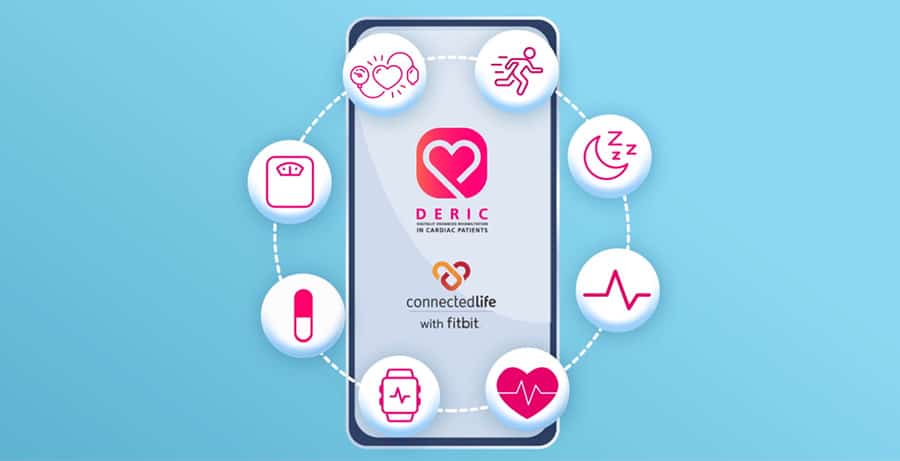Three NHS trusts trial smart tech to enable cardiac rehab in patients’ homes

Northumbria Healthcare NHS Foundation Trust, Sheffield Teaching Hospitals NHS Foundation Trust, and Imperial College Healthcare NHS Trust are taking part in a major new study that is trialling digital technologies to support the recovery of heart attack patients.
This initiative is expected to free up vital hospital space and ease pressure on healthcare professionals by facilitating remote monitoring. It can also address barriers to face-to-face programmes.
The three NHS trusts are participating in the trial of the Digitally Enhanced Rehabilitation in Cardiac Patients (DERIC) care platform.
DERIC has been developed by health technology company ConnectedLife to enable cardiac rehabilitation to be delivered to patients in their own homes, leveraging devices and services from Fitbit and Google Health.
Cardiac rehabilitation is a programme of exercise, information sessions, and support to help patients get back on their feet again after a heart attack or heart surgery.
The DERIC programme uses a Fitbit smartwatch to help patients measure heart rate, rhythm, and physical activity.
A ConnectedLife mobile app enables patients to enter additional health data (such as blood pressure and weight) and answer questions about diet and other health information. They can also view a summary of their activity and health and wellness data and communicate with their care team.
A ConnectedLife dashboard summarises data patients share to the app for the hospital care teams to use when having conversations and exchanging messages with patients as part of the patient’s care plan.
“The combination of Fitbit and ConnectedLife provides users with an overview of their activity, heart data and other health related information allowing them to manage their own day-to-day wellbeing,” said Nicola Maxwell, Head of Fitbit Health Solutions, Europe, Middle East & Africa. “This collaboration helps doctors, nurses and other health professionals to remotely monitor their patients. It could lead to better condition management and potentially reduce the burden on the healthcare system.”
Cardiac rehabilitation services are used by more than 100,000 patients annually in the UK, according to the British Heart Foundation.
The benefits for patients and cost effectiveness of the DERIC platform in the NHS will be compared with current cardiac rehabilitation programmes in a randomised trial at the three trusts. No one outside the NHS, including the companies involved in developing the platform, is granted access to any patient medical records.
Prof Nicholas Peters, Consultant Cardiologist at Imperial College Healthcare NHS Trust, explained: “The main aim of the DERIC trial is to assess whether cardiac rehabilitation delivered via the DERIC platform is at least as good as current standard-of-care. If DERIC proves effective, we hope that it will deliver enhanced patient experience, improved population health outcomes, improved staff experience, reduced costs and increased efficiency and value for money.”
The programme is being supported by NHS Digital Health Partnership Awards Funding, which was given in recognition of the potential for high quality and effectiveness of the platform in remotely supporting patients with cardiovascular disease or at risk of developing it.
The British Heart Foundation Data Science Centre at Health Data Research UK (HDR UK) is advising on the trial design, conduct, and analysis. Funding from the award will help accelerate the assessment.
Andrew Edmunds, Director of Innovation at Northumbria Healthcare, commented: “Continually improving patient care and experience is always at the core of all we do. Given the complex nature of cardiac rehabilitation and care, the need to widen participation and improve the quality of remotely delivered solutions is very apparent. We want to explore to what degree digital technologies may offer a solution, while also addressing health inequalities.”
According to the three NHS trusts, UK hospitals consistently fail to achieve targets for cardiac rehabilitation uptake and completion, partly due to the inconvenience of attending face-to-face sessions and a lack of personal tailoring of current rehabilitation programmes.
The DERIC trial hopes to tackle this issue.
Dr Susan Thomas, Clinical Director at Google Health London, said: “We are excited by the DERIC programme’s potential to widen participation, address health inequalities and improve the quality of remotely delivered cardiac rehabilitation programmes.
“If the evaluations suggest DERIC could benefit patients and health systems, there is the potential to extend the programme to other NHS sites and explore its use in other care pathways which might benefit from remote patient monitoring and communication.”
To support the DERIC programme’s continuation and expansion, Fitbit and Google Health are matching the funding given by the Digital Health Partnership Awards. DERIC is designed to be embedded securely within NHS systems.

